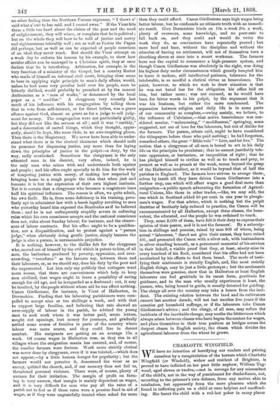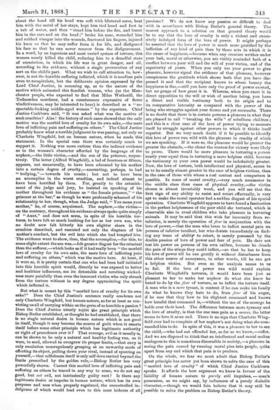CHARLOTTE WINGFIELD.
WE have no intention of horrifying our readers and paining ourselves by a recapitulation of the horrors which Charlotte Wingfield (or Winfield), widow and resident of Brighton, is proved to have inflicted on her poor little nephew, William Tug- wood, aged eleven or twelve,—not in revenge for any misconduct of the child's, not in the way of punishment for disobedience, not, according to the prisoner's own defence, from any motive akin to retaliation, but apparently from the mere pleasure which she found in inflicting pain on a child at once helpless and unoffend- ing. She burnt the child with a red-hot poker in many places about the head till his head was soft with blistered sores, beat him with the metal of her stays, kept him tied hand and foot in a tub of water, and then "stood him before the fire, and burnt him in the ears and on the head ;" broke his nose, wounded him and rubbed vinegar into the wounds, fractured his fingers, injured his knee so that he may suffer from it for life, and disfigured his face so that he can never recover from the disfigurement. In a word, by an ingenious and most varied system of torture, this woman nearly killed the child, reducing him to a dreadful state of emaciation, in which his life was in great danger, and all, according to the evidence, without a single provocation of any sort on the child's part. What we wish to call attention to, how- ever, is not the horrible suffering inflicted, which it is needless pain even to recapitulate, but the deliberate opinion expressed by the Lord Chief Justice, in summing up, as to the nature of the motive which animated this fiendish woman, who (as the Man- chester people, who expected to find that Miles Wetherill, the Todmorden murderer, had a countenance expressive of fierce vindictiveness, may be interested to hear) is described as a " re- spectable-looking middle-aged woman " by the reporters. Chief .Justice Cockburn said, " It was asked what was the motive of such cruelties ? Alas ! the history of such cases showed that the only motive was the morbid love of cruelty for its own sake,—the mere love of inflicting pain and suffering on others." The Chief Justice probably knew what a terrible judgment he was passing, not only on 'Charlotte Wingfield, but on human nature, when he made this statement. In the special case there was certainly much to support it. Nothing was more curious than the indirect evidence -as to the woman's character afforded by the language of the nephew,—the little victim,—and the son of the prisoner, respec- tively. The latter (Alfred Wingfield), a lad of fourteen or fifteen, appears, not unnaturally, to have been educated by his mother into a certain degree of cruelty,—amounting, perhaps, to bad 4' bullying," — towards his cousin ; but not to have been an accomplice in the worst cruelties, and indeed almost to 4iave been horrified by them. For, greatly to the astonish- ment of the judge and jury, he insisted on speaking of his mother throughout his evidence as " the female prisoner," " the prisoner at the bar," as though he were profoundly ashamed of his welationship to her, though, when the Judge said, " You mean your mother," he, of course, acquiesced. The nephew,—the victim— on the contrary, throughout his evidence always spoke quite simply -of " Aunt," and does not seem, in spite of his horrible tor- tures, to have felt so much loathing for her as her own son, who .no doubt now felt bitterly his own slighter share in the cruelties described, and resented not only the disgrace of his mother's conduct, but the evil into which she had tempted him. "The evidence went to show, then, that the accomplice,—f or this, to some slight extent the son was,—felt greater disgust for the criminal than the sufferer,—which looks as if it had really been " the morbid love of cruelty for its own sake, the mere love of inflicting pain and suffering on others," which was the motive here. At least, if it were so, it is pretty certain that one who had been half initiated into this horrible spirit would, directly he was exposed to better and healthier influences, see its detestable and revolting wicked- ness more painfully than even the innocent victim who only shrank from the torture without in any degree appreciating the spirit which inflicted it.
But what is meant by this " morbid love of cruelty for its own sake?" Does the Chief Justice's sentence really condemn not only Charlotte Wingfield, but human nature, so far at least as con- victing us all of carrying within us the germ of so horrible a passion ? Does the Chief Justice utterly reject the great principle which Bishop Butler established, or thought he had established, that there is no single natural desire in human nature which is not good in itself, though it may become the source of guilt when it asserts itself before some other principle which has legitimate authority or right of precedence over it ? That revenge, evil as it usually is, can be shown to be only a natural and healthy feeling run, as it were, to seed, allowed to overgrow its proper limits, —that envy is only emulation unscrupulously grasping at an unworthy mode of effecting its object, pulling down your rival, instead of spurring on yourself,—that selfishness itself is only self-love carried beyond the limits prescribed by the golden rule,—Bishop Butler has very powerfully shown. Cannot this morbid love of inflicting pain and suffering on others be traced in any way to some, we do not say good, but not evil, not intrinsically guilty root? Is there any legitimate desire or impulse in human nature, which has its own purposes and uses when properly regulated, the uncontrolled in- dulgence of which would lead even to this most hideous of all passions ? We do not know any passion so difficult to deal with in accordance with Bishop Butler's general theory. The nearest approach to a solution on that general theory would be to say that the love of cruelty is only a violent and exces- sively indulged form of the love of power. It might perhaps be asserted that the love of power is much more gratified by the infliction of any kind of pain than by those acts in which it is the cause of happiness,—because when any creature writhes under your lash, moral or otherwise, you are visibly reminded both of a conflict between your will and the will of your victim, and of the superiority of yours. When you only use your power to give pleasure, however signal the evidence of that pleasure, however conspicuous the gratitude which shows both that you have dis- pensed it and that the recipient knows to whose bounty the happiness is due,—still you have only the proof of power exerted, but no gauge of how great it is. Whereas, when you exert it in direct opposition to the will or wish of another being, you have a direct and visible testimony both to its origin and to its comparative intensity as compared with the power of the being who struggles against your decree and yet succumbs. There is no doubt that there is in certain persons a pleasure in what they are pleased to call " breaking the wills " of rebellious children ; and this is a clear case of the love of power trying to measure itself by struggle against other powers to which it thinks itself superior. But we very much doubt if it be possible to identify this love of power run wild with the pleasure in cruelty of which we are speaking. If it were so, the pleasure would be greater the greater the obstacle, —the closer the contest for victory were likely to prove. There would be more pleasure in torturing a person nearly your equal than in torturing a mere helpless child, because the testimony to your own power would be indefinitely greater. Now, the love of torture, both intellectual and physical, seems to us to be usually almost greater in the case of helpless victims, than in the case of those with whom a real contest and comparison is possible. In cases of moral cruelty,—very much commoner in the middle class than cases of physical cruelty,—the victim chosen is almost invariably weak, and you will see that the first sign of any ability to resist and retort effectually, is very apt to make the moral operator feel a sudden disgust of his special operation. Charlotte Wingfield appears to have found a fascination in the perfect helplessness of the poor child she tortured, which is observable also in cruel children who take pleasure in torturing animals. It may be said that this wish for immunity from re- taliation, is merely the operation of fear in conjunction with the love of power,—that the man who loves to inflict mental pain on persons of inferior intellect, but who desists immediately on find- ing any trace of ability to retort, is merely possessed by the double passion of love of power and fear of pain. He dare not test his power on persons of his own calibre, because he dreads the pain of the stings they could inflict,—so that he has to keep his love of power till he can gratify it without disturbance from this other source of annoyance, in other words, till he can get a helpless victim. But even so the analysis seems to us to fail. If the love of power run wild would explain Charlotte Wingfield's tortures, it would have been just as pleasant to her to make her nephew do what she knew he hated to do by the fear of torture, as to inflict the torture itself. A man who is a mere tyrant, is content if he can make his family do what he knows they hate to do, from fear of his anger, if he sees that they bow to his slightest command and knows how hateful that command is,—without the use of the scourge he holds over their head. The difference between mere tyranny and the love of cruelty, is that the one uses pain as a means, the latter seems to love it as an end. There is no sign that Charlotte Wing- field ever had to complain of her nephew's not doing what she com- manded him to do. In spite of this, it was a pleasure to her to see the child,—who had not offended her, as far as we know,—suffer. And we are disposed to think that an intellectual and moral malice analogous to this is sometimes discernible in society, —a pleasure in seeing the pain caused by running moral pins into people, quite apart from any end which that pain is to produce.
On the whole, we fear we must admit that Bishop Butler's great principle has never yet been shown to solve the case of this " morbid love of cruelty" of which Chief Justice Cockburn speaks. It affords the best argument we know in favour of the liability of human nature to purely evil impulses, — man's possession, as we might say, by influences of a purely diabolic character,—though we would fain believe that it may still be possible to solve the problem on Bishop Butler's theory.































 Previous page
Previous page